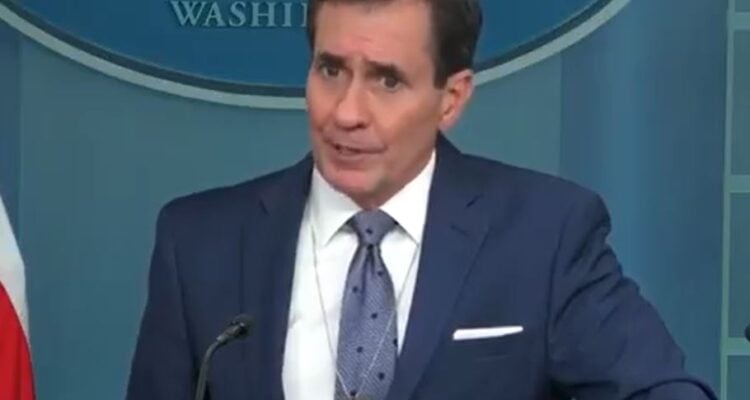In U.S. President Joe Biden’s view, ‘smashing’ into Rafah ‘will not advance that objective of defeating Hamas,’ Kirby said.
By Andrew Bernard, JNS
Despite the apparent collapse of a ceasefire-for-hostages deal with Hamas, the White House believes a ground operation in Rafah would benefit Hamas, John Kirby, the White House national security communications advisor, told reporters on Thursday.
“Our view is that Rafah operations—certainly any kind of major Rafah ground operation—would actually strengthen Hamas’s hands at the negotiating table, not Israel’s,” Kirby said. “That’s our view.”
“If I’m Mr. Sinwar and I’m sitting down in my tunnel—I think that’s where he is—and I’m seeing innocent people falling victim to major significant combat operations in Rafah, then I have less and less incentive to want to come to the negotiating table and deal,” Kirby said, of Hamas leader Yahya Sinwar.
“I can cast Israel in the worst possible way because of the way they’re behaving and I can just say, well, clearly they’re just not interested in a good faith way to get to a ceasefire, look at what they’re doing inside Rafah,” Kirby added, channeling Sinwar. “It just gives him more ammunition for his twisted narrative.”
Kirby told reporters about the Biden administration’s conditions on providing U.S. munitions and what it wants to see Israel do instead of a military operation against the Hamas-held enclave.
“The president has tasked his team to continue to work with Israel to refine their strategy to inflict an enduring defeat on Hamas,” Kirby said. “An enduring defeat of Hamas certainly remains the Israeli goal, and we share that goal with them.”
In U.S. President Joe Biden’s view, “smashing” into Rafah “will not advance that objective, will not get to that sustainable, enduring defeat of Hamas,” Kirby said.
Washington and Jerusalem can work together “to help Israel make sure that the border between Gaza and Egypt can’t be used for a smuggling of arms and weapons into Hamas,” Kirby added.
Kirby added that the United States could also help Israel target Hamas commanders, including Sinwar, Hamas’s leader in Gaza who orchestrated the Oct. 7 attacks.
He also said that Washington is providing Israel with assistance to do so on an ongoing basis.
The Biden administration could work with Israel on “standing up an alternative governance structure to Hamas” in Gaza, Kirby said.
JNS sought comment from the White House about who the administration thinks should govern Gaza and how the United States would assist in setting up a new government.
‘This was a horrible mistake’
U.S. Secretary of Defense Lloyd Austin testified before a congressional committee on Wednesday that the administration paused a “shipment of high payload munitions” to Israel amid concerns from Washington about Israel launching a ground operation in Rafah.
The Associated Press reported that the shipment consisted of 3,500 bombs weighing 2,000 and 500 pounds.
In an interview with CNN on Wednesday, Biden suggested that he would cut off all non-defensive arms shipments to the Jewish state if it mounted a campaign against Hamas in Rafah.
“I made it clear that if they go into Rafah—they haven’t gone in Rafah yet—if they go into Rafah, I’m not supplying the weapons that have been used historically to deal with Rafah, to deal with the cities—that deal with that problem,” Biden said.
“We’re going to continue to make sure Israel is secure in terms of Iron Dome and their ability to respond to attacks that came out of the Middle East recently,” he said. “We’re not going to supply the weapons and artillery shells.”
American Jewish organizations and Republicans and some Democrats in Congress slammed Biden’s decision to withhold the arms shipment and to threaten to cut off other supplies if Israel goes into Rafah.
Sen. Jim Risch (R-Idaho), ranking member on the Senate Foreign Relations Committee, said at a press conference on Thursday that if Biden wants to reduce Palestinian civilian casualties he should approve the sale.
“What is the system that they’ve held up? It’s the kits that make the bombs into ‘smart’ bombs and precision bombs instead of a general bomb,” Risch said. “They’re doing exactly the opposite of what they say they’re trying to do. This is simply a nod to their far-left flank.”
“Within two hours of the president’s announcement last night, Hamas said they were withdrawing from negotiations on hostages and the ceasefire,” he said.
“What the president has done is handed a great victory to Hamas here,” he added. “He’s going to invigorate the fighting that they’re doing in Gaza, and it’s going to stop the negotiations that have been ongoing. This was a horrible mistake.”
Biden administration officials have previously said the primary incentive for Hamas to accept a ceasefire deal would be to alleviate the suffering of Palestinian civilians.
“The well-being of the people in Gaza that Hamas has always claimed they represent ought to be incentive enough for them to take this deal. Period,” U.S. State Department spokesman Matthew Miller said at a press briefing on May 2.
“This is one of those rare issues where it’s just actually not that complicated,” Miller said.
Kirby said on Thursday that the administration has not given up on achieving a deal with the terrorist group.
“We still believe that there’s a path forward, but it’s gonna take some leadership on both sides,” Kirby said. “It’s going to take a little bit of moral courage on both sides to finally be able to come across that table and ink this deal.”





